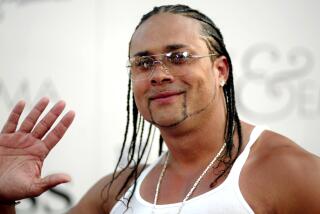The Value of Fatherhood
Here it is August, practically Labor Day, and who would believe that a Los Angeles courtroom would be puzzling over whether this is Fatherâs Day or payday?
The probate trial in Department 18 concerns the estate of Tupac Amaru Shakur, deceased. When he was killed in Las Vegas last year he was 25 years old, and almost as rich as he was famous.
William Garland, the man whose contribution to young Shakur (apart from the requisite 23 chromosomes) amounted to $820, a bag of peanuts and a ticket to âRollerballâ--or so Shakurâs motherâs lawyer says--is now laying claim to half of whatever the rapper/actor was worth.
Mother Afeni Shakurâs side says Mr. Sperm Donor Garland never laid eyes on Tupac for 18 years, from the time the boy was 5 years old until Garland saw an ad for his first movie and called. Garland says thatâs only because Afeni Shakur up and disappeared with the boy.
What still goes unexplained is the stalwart fiction, maintained in Tupacâs press biography and even after he died, that his father had been shot to death long ago.
In the 1930s and â40s, at studios like MGM and Fox, publicists padded and pancaked their starsâ biographies, giving tough-guy rap sheets to class nerds and finishing-school pedigrees to reform-school bad girls.
Something of the same was true of Tupac. His lowlife-imitates-art swagger would come later; his artistic debut, at 13, was in an Apollo Theater benefit of âRaisin in the Sunâ for Jesse Jacksonâs presidential campaign. He read âMacbethâ and âLes Miserablesâ because he enjoyed them.
Tupacâs mother was a Black Panther; the outlaw romance of an unnamed father, not long out of prison, gunned down mysteriously, is mythic and legend-making. More so, certainly, than a very much alive New Jersey truck driver with three kids by another woman. DNA tests indeed found Garland to be Tupac pere.
In court, Garland told fatherly tales of little Tupac, taking him shopping with his other kids. Shakur and another son, bed-wetters both, sometimes got put to bed together, dad recalled; âThey could pee [with] each other.â
It was the deathbed-scene testimony--Shakur in a Vegas hospital giving âpopsâ a signed photo last September--that finally did it for Afeni Shakur. Garland, she seethed, âdonât even know my sonâs birthday.â
On other floors and in other courtrooms, such things were were being said of other peopleâs children at the same moment: You never visited, never sent Christmas presents . . . you took him away, never let me see him--did-not/did-so inanities, but about the care of a living child, not the inheritance of a dead one.
I was set to thinking of the compound tragedy of Latasha Harlins, the 15-year-old girl shot dead in 1991 by a grocer in a tussle over a $1.39 bottle of orange juice.
A year after Latasha died, the father who hadnât seen her in some nine years, who didnât attend her funeral even after the family sent him plane fare, was in a Los Angeles courtroom, trying to cut off a chunk of the $300,000 insurance settlement on Latashaâs life. The judge, in cutting off the father, laconically wrote that the evidence showed âa lack of care by the father for the child.â
It may be that Tupac Shakur thought more about Latasha than her own father did. In 1993, he mentioned her to a reporter. âA bottle of juice,â he mused, âwas not something to die for.â
Neither, as it turns out, was a gangsta persona.
*
I stayed late at the office the second night of the heat wave, partly from the workload and partly to freeload on the air conditioning. It was about 11 when I left, so I was appalled to see a woman pushing a stroller up Temple Street with two toddlers at her heels.
I rolled down the car window; the cooled air was sucked out like an expiring accordion. You OK? I asked. Trying to catch the bus, she panted. She was going home to the San Fernando Valley and hoped it was still running this late.
The kids fell asleep from the instant they climbed into my car, but the woman lowered her voice anyway, and talked as I drove.
It had been a two-hour bus trip to Long Beach, on the hottest day of the year. The kidsâ father had not gone to church Sunday, as he promised he would, so she went to see what was what, and one thing led to another and he knocked her around a little in front of the kids, and thatâs what sheâd gone to find out: if the Lord meant for her to get on with her life, and he did, and now she could, and sometimes kids were better off with no father than a bad one.
*
The day before Tupac Shakurâs parents went to court, a fathers group met near the airport. MAD DADS, Men Against Destruction Defending Against Drugs and Social Disorder, is a cumbersome acronym, as big and unwieldy as the task the men have taken upon themselves, to contrive a working model of modern fatherhood, from big crises to small matters, like the fact that one manâs teenage son can rattle off Tupac lyrics but still struggles with geometry. Unlike Oscar Wildeâs notorious cynic, these men want to put a value on fatherhood, not a price.
On other floors and in other courtrooms, such things were were being said of other peopleâs children at the same moment: You never visited, never sent Christmas presents . . . you took him away, never let me see him--did-not/did-so inanities, but about the care of a living child, not the inheritance of a dead one.
More to Read
Sign up for Essential California
The most important California stories and recommendations in your inbox every morning.
You may occasionally receive promotional content from the Los Angeles Times.











